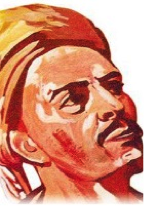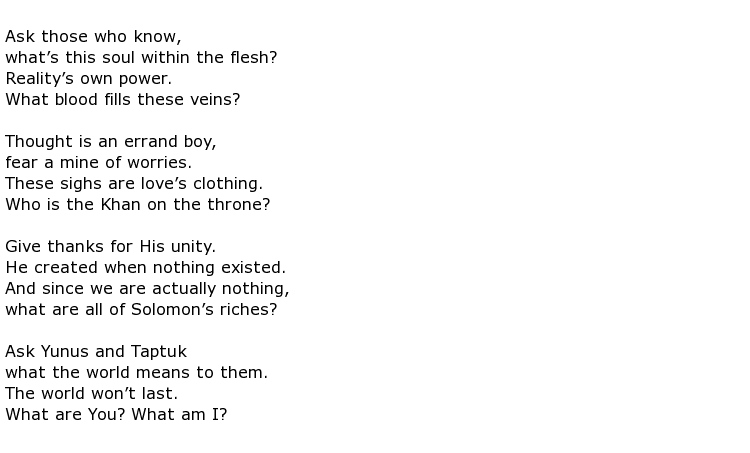 Yunus Emre was a simple, devoutly religious Turkish poet and Sufi mystic whose life spanned both the 13th and 14th centuries. He made a point of writing, singing and speaking in the true Turkish language of the day rather than adopting the Persian or Arabic speech that was prevalent in his own country, particularly amongst the sophisticated. Sufis were Muslim mystics and he has also been described as a Sufi Dervish, meaning that he practiced frenzied, very energetic dancing, probably whipping himself, and all those present, up into a state of highly religious fervour. Emre’s poetry covered subjects such as the love of divinity and human destiny, written in the traditional style of Anatolian folk-poetry.
Yunus Emre was a simple, devoutly religious Turkish poet and Sufi mystic whose life spanned both the 13th and 14th centuries. He made a point of writing, singing and speaking in the true Turkish language of the day rather than adopting the Persian or Arabic speech that was prevalent in his own country, particularly amongst the sophisticated. Sufis were Muslim mystics and he has also been described as a Sufi Dervish, meaning that he practiced frenzied, very energetic dancing, probably whipping himself, and all those present, up into a state of highly religious fervour. Emre’s poetry covered subjects such as the love of divinity and human destiny, written in the traditional style of Anatolian folk-poetry.
Understandably, the details of his life and death are sketchy and, in fact, sometimes contradictory. He was so loved by the common people of his land that the inhabitants of several villages claimed that Emre was born amongst them. He was born either in 1238 or 1240 and probably lived in the Karaman area of Anatolia.
His poetry was seen by many as liberating and his popularity still survives even today, some 700 years after his death. He wrote in the same way that people in Central and Western Anatolia spoke and he was copied by other poets at that time such as Ahmet Yesevi and Sultan Veled. Other writers of folklore, fairy tales, riddles and proverbs used the same style, all trying hard to break away from the more formal Persian influences that had gone before. A typical example of his poetry is one called Ask those who know and the translation of it is below. It is a simple enough message on the surface but with deeper meaning below:

The Turkish word for riddles is tekermeler and he adopted this previously oral tradition as a device for constructing his poetry which, in the main, displayed his deep love of God and humanity. Many had an underlying, obscure message which would have been difficult for many to understand had it not been for the fact that he kept things simple on the surface. Mystical concepts were made clear for the simplest of reader and, as a result, he was a much loved poet across the whole Anatolian region. His popularity is undiminished, with people from as far apart as the Balkans and Azerbaijan still declaring a love of the poetry of Yunus Emre.
Naturally he had contact with many other writers and artists in his region and one, named Rumi, was also a Sufi. Unlike Emre, Rumi wrote in the more literary language of Persian for other well-read and sophisticated Sufis. It is said that the two met one day and Rumi asked his friend for an opinion on one of his great pieces of work (called Mathwani). Emre declared that it was excellent but that he would have done it differently. When asked how Emre, perhaps illustrating his simple philosophy on life, said that he would have written:

Details of Yunus Emre’s death are a little unclear but it is believed that he died in 1320, thus making him at least 80 years old. In the same way that many different villages were said to be his birth place, so it was in death with a number of locations for his final resting place being declared.

